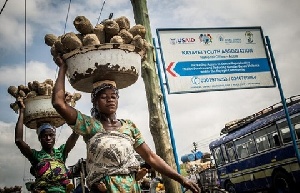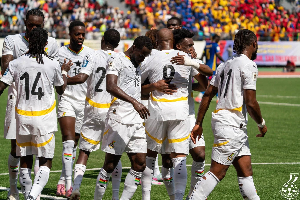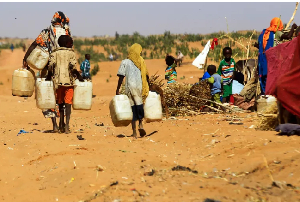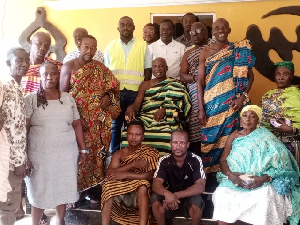By: Dr. Michael Kpessa-Whyte
Introduction
Ghana’s political system has since 1992 been dominated by the National Democratic Congress (NDC) and the New Patriotic Party (NPP) following the re-introduction of constitutional democracy after several years of political instability. Both parties have won elections and had the opportunity of controlling the allocation of state resources. Often, political parties are differentiated on the basis of their views about human nature, society, what is considered a good and just society, and their preferred approach to improving the human condition.
Even though the NDC is a social democratic party and the NPP a liberal democratic party, both parties have hardly demonstrated how this ideological ascriptions reflect in the policies and programs they pursue, and the extent to which such policies have goodness of fit with their fundamental political beliefs. This gap in our national policy discourse has denied us of a more rigorous and well informed conversation about why parties adopt some policy options and ignore others. As a result, policy-related discussions in Ghana are often wrapped in partisan propaganda and sentimentalist debate.
In the 2017 budget statement of the NPP administration presented to Parliament, by the Minister of Finance, Hon. Ken Ofori Atta, he announced that government has with immediate effect, abolished market tolls imposed on head porters commonly called Kayayei by some District Assemblies in Ghana. The abolishing of the market tolls by the NPP administration is in sharp contrast to the approach adopted by the NDC, which focused on skills training and entrepreneurial support for the young girls referred to as Kayayei. To explain the difference in approach by the NDC and the NPP to the Kayayei phenomenon in Ghana one must appreciate the core ideological belief of these parties and the extent to which those beliefs shape the choices they made on the issue. Political ideology refers to a set of beliefs and ideas about the nature of human society in which citizens live, and the proper role of governments in establishing or maintaining that society.
NPP’s Liberal Democratic Belief
The NPP as a liberal democratic party, holds the view that every citizen is born free and must be allowed to pursue his or her career aspirations without restrictions or impediments. According to liberal democrats, the pursuit of freedom and equal rights of the citizenry requires that everyone is allowed to compete for a fair share of the social and economic benefits society has to offer.
The liberal democratic ideology to which the NPP ascribes has a core narrative - the idea that every individual was born free, and that liberty of citizens to pursue their interests, especially in economic transactions is an inalienable right that must be safeguarded at all times. Citizens, according to liberal democrats only surrender a minute piece of their liberty in exchange of some other good like security, which must be provided by the state in order to ensure that the pursuit of individual interest by all does not degenerate into chaos.
The NPP as a liberal democratic party therefore sees the State, and for that matter government as necessary only to the extent that it does not interfere with the enjoyment of individual rights of citizens, and rather focuses on ensuring equal opportunity or providing leveled playing field for people to pursue their interests and other endeavors. In particular, liberal democrats, cautioned against government intervention in the activities of the market because in their view, any such intervention will be an affront to the liberty of the citizenry in the pursuit of their chosen interests and aspirations.
According to liberal democrats, as long as there is equality of opportunity, and the balance of human interaction or economic transaction among the citizenry is not tilted in favour of any particular person or group of persons, it is only normal and natural to expect that some of the citizens will be winners and others losers or some will be wealthy and others poor especially in the case of economic transactions. Liberal democrats like the NPP argue that this outcome should not surprise anybody because in competitive transactions, those who work harder or have superior capabilities will gain while those perceived as lazy citizens will lose. Liberal democrats therefore believe that wealth and poverty are products of the choices individuals make in the exercise of their liberty.
The NPP as a liberal democratic party therefore ascribes to an ideology that suggests that inequality in society is natural, and that inequality should not be seen as a problem as all citizens have equal opportunity to pursue their chosen interests, and particularly so, in matters of private economic transactions. Liberal democratic ideology therefore emphasizes individual liberty, competition, choice, limited government, equal opportunity, and is usually supported in partisan politics by owners of private business entities.
Linking NPP Belief System to Kayayei Tolls Abolition
From its ideological standpoint, how does one make sense of the NPP policy of abolishing market tolls imposed on the Kayayei by some District Assemblies?
NPP like all liberal democrats argue that:
a. As equal citizens, Kayayei chose to pursue a career in headportership as an economic enterprise in the midst of the many options available to them.
b. Kayayei are free citizens who know what is best in their interest and the implications of the choices they make in life.
c. The choice of plying a trade in head portership is in sync with the Kayayei’s individual rights as citizens and must be supported.
d. The imposition of market tolls on the Kayayei restricts the exercise of their freedom to choose and equally participate in any economic activity of their preference, in this case the headportership.
e. The imposition of market tolls also denies the Kayayei a meaningful opportunity to compete in the larger economic arena with other economic actors and be successful.
f. Abolishment of market toll reflects the liberal democratic view that government should refrain from imposing or limiting the exercise of individual rights.
g. The abolishment of the market tolls is a liberal democratic approach to ensuring that the Kayayei pursue their chosen career interest without any taxation related impediments.
NDC’s Social Democratic Belief
Unlike liberal democrats, the NDC in line with social democratic thought holds the view that society or the political community (the State) is natural and an organic entity in which all citizens are equal. For the NDC, nobody in the country is self-sufficient not to need assistance from another, and therefore human beings exist to support and show solidarity with each other in the pursuit of a good and just society. According to social democratic adherents like the NDC, even though citizens are born equal, certain historical practices such as colonialism, gender discrimination, racism, previous political and social systems, policy legacies, slavery, poverty, illiteracy, inheritance, and some traditional practices have sharpen the competitive abilities and productive capabilities of some citizens, and weaken that of others like the Kayayei.
As a social democratic party, the NDC holds the view that citizens like the Kayayei, who were victims of the past, cannot be said to have equal opportunity in pursuing interests and careers of their choice. In line with social democratic belief, the NDC therefore avers that the entire premise of liberal democracy was designed to protect the rich and powerful in society not only against the poor and weak, but also in a manner that perpetuates the inequalities that arise especially out of economic transactions. The NDC like all social democrats therefore maintains that market economy acts in the interest of citizens with the most resources and capabilities, and by extension rewards those who have assets such as information, capital or education as a result of prior advantage.
The primary concern of the NDC and social democrats in general, is with material inequality among the citizenry and how that condition serves as an impediment to the idea of equal opportunity for access to the resources in the country. They therefore maintain that the pursuit of a good and just society must go beyond equality of opportunity to work towards equality of outcomes. Based on this premise, social democratic parties like the NDC seek political power in competitive elections to use the authority vested in government as an instrument of collective action, to address the factors that impose limitations on the least privileged in the country, and support them to live as truly equal citizens.
The NDC as social democratic party has stronger preference for using the state to empower the disadvantaged and enhance their productive capabilities because they believe that such actions will not be easily supported by the rich and powerful unless engineered through government policy. The most important task of governments, according to social democrats like the NDC, is to regulate, reform and socialize the idea of unregulated market economy as espoused by liberal democrats in order to ameliorate inequalities it creates. Hence, in contrast to individual ownership, social democrats have preference for arrangements that tilt the balance of action towards collective or public ownership of the means of production, distribution and redistribution of wealth as a strategy to avert social and economic inequalities.
The NDC as a social democratic party therefore subscribes to an ideology that priorities equality in the living conditions of all Ghana, solidarity among the citizenry, inclusiveness, collective and cooperative approach to problem-solving, and protection of the vulnerable in society. When in government, social democrats usually deploy a wide array of policy instruments including affirmative action programs, corporate social responsibility, cash transfers, high corporate taxes, skill training, legal aid, and public-private partnerships among others to socialize and humanize economic transactions, and encourage the least-privileged of the citizens like the Kayayei to improve their chances of a decent and dignified life. In arena of partisan politics, social democrats are usually supported the labour force or workers, rural dwellers, women, and those who feel disadvantaged by circumstances of their past.
Linking NDC Belief System to Skill Training for Kayayei
Giving the NDC’s ideological preference, a number of categorical conclusions can be drawn from the party’s choice of skills training and entrepreneurial support for the Kayayei as a policy option. Like all social democrats do, NDC’s policy of enhancing the productive capacity of the Kayayei is informed by the belief that:
a. Kayayei come from a part of Ghanaian society where the citizens have been historically disadvantaged especially in the colonial area making it difficult for them to possess what it takes to live a life equal to others in society and therefore compete equally.
b. Kayayei cannot be said to be free citizens in comparison to all others because poverty, illiteracy and exploitation have imposed limitations on their ability to efficiently compete in economic transactions.
c. Entrepreneurial support and skills training is in line with the social democratic view that government as an instrument of collective action must intervene in the market to adjust the disparities between the rich and the poor in a manner that empower the poor to have options for a meaningful and improved life, but does not disadvantage the rich.
d. The use of taxes collected by the government to support the wellbeing and welfare of citizens like the Kayayei in order to avert being locked into perpetual poverty is in line with social democratic believe in solidarity.
e. The idea of using entrepreneurial support and skills training to push the Kayayei up the economic ladder is a demonstration of the NDC’s commitment to the pursuit of the social democratic idea of equality of outcomes.
f. Apart from the fact that it is not an art of good governance for central governments to unilaterally abolish decisions taken by local governments, the NDC did not abolish the tolls imposed on the Kayayei because of a deep social democratic belief in the use of taxes beyond revenue mobilizations to include discouraging citizens from engaging in activities such as Kayayei that liberalizes poverty, and allows the rich and wealthy to further exploit the poor.
Conclusion
Even though the NPP’s policy has been described widely as populist, and its selectivity has also generated some controversy, it must not be lost on Ghanaians that the NPP as a party is simply pursing a policy in sync with its ideology. In that ideology, you are free as a citizen to choice what interest and career you intend to pursue. In NPP’s view therefore, regardless of the social or prior economic circumstances that may have compelled you to choose that interest or career, that choice is an exercise of your liberty, which must be respected by all including the state or government. It is an ideology of survival of the fittest, which does not take into account the actual vulnerabilities associated with the Kayayei business, and so promotes it under the guise of respecting the rights of individual citizens to choose what economic interests to pursue. In reality, the NPP’s approach is a policy that locks the Kayayei into a permanent cycle of poverty with virtually no route of escape.
The NDC’s approach to the Kayayei situation did not attract much public attention probably because it lacks elements of populism, however, it underlines a deep-seated concern for community wellbeing as opposed to “the everybody for himself” approach of the NPP. In the opinion of the NDC, Ghana is made up of Ghanaians. Ghanaians including the Kayayei, who constitute the society call Ghana, do not exist outside of Ghana. The NDC therefore subscribes to an ideology of “no one should be left behind” in which through government policy, the country looks out for its citizens who have suffered one form of vulnerability or the other and makes conscious efforts to empower them so as to enhance their productive capabilities to contribute meaningfully to economic growth. It is therefore important to note that the NDC as social democratic party is not necessarily opposed to the market; instead, it perceives the market as an instrument of society, and not society being the instrument of the market as liberal democrats like the NPP would have us belief. NDC’s approach is a policy that unlocks the human potential of the Kayayei to make them productive in a manner that has a positive backward linkage to economic growth for both the Kayayei and the larger society.
By: Dr. Michael Kpessa-Whyte
Opinions of Wednesday, 15 March 2017
Columnist: Dr. Michael Kpessa-Whyte















